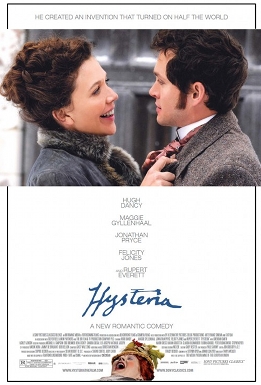From the outset, Hysteria exhibits a winking "Can you actually believe this?!"
attitude. After opening with the
familiar "This film is based on actual events," it tacks on a "Really" to
counteract any skeptics in the audience. And yet this exact attitude gives the
film a markedly unbelievable feel.
Hugh Dancy comfortably steps into the role of
Mortimer Granville, an outspokenly idealistic, yet awkwardly uptight doctor
stuck in an old-fashioned world of medicine still practicing the use of leeches
and tonics. After getting fired
from his position at the hospital for speaking out in favor of germ theory,
Granville finds himself thrust into the role of assistant to Jonathan Pryce's
Dr. Robert Dalrymple, a doctor who treats female hysteria through vaginal
massage. Many montages later,
Granville invents the electric vibrator, due to a hand injury sustained from
masturbating too many women. Hijinks ensue.
Shoehorned into this (most undoubtedly
fictionalized) historical account of the first sex toy is a trite romantic comedy
love-triangle plot. Felicity Jones
and Maggie Gyllenhaal portray Dr. Dalrymple's daughters, Emily and Charlotte,
respectively. Emily is his proper
young daughter, devoted to the idea of being a lady. Charlotte is the
manic-pixie-dream girl devoted to making men crazy, yet in that "lovable" way
these romantic comedies continue to shove down our throats. Granville pursues Emily, believing he
can have a full life taking over Dalrymple's medical practice and having a
dutiful wife. But he soon finds
himself drawn to Charlotte's brazen attitude and ideals.
Hysteria gets decent performances out of Dancy,
Gyllenhaal, and Pryce, as well as Rupert Everett as Granville's old friend and
collaborator, Edmund St. John-Smythe.
Yet the characters, dialogue, and, most of all, plot never reach
anything higher than cloyingly cute.

